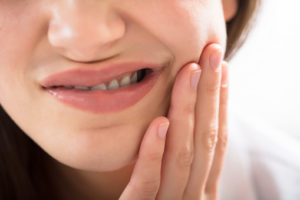Dental erosion is the loss of tooth enamel caused by acids without involving bacteria. The hard enamel layer protects the inner structures of the tooth. Acids can dissolve the tiny crystals that make the enamel. When this hard protective surface is worn, the underlayer called dentine is exposed. The yellow dentine layer forms the bulk of each tooth and protects the existing inner structure called the pulp cavity. When dental erosion is advance, the yellow dentine can be visible. Exposed dentine can lead to pain and sensitivity.
Causes of dental erosion
Your dentist can detect dental erosion during routine dental checkups. Dental erosion can have either intrinsic or extrinsic causes. Intrinsic erosion results from the continual introduction of gastric acid into the oral cavity. Stomach acids from gastroesophageal reflux and frequent vomiting over time can significantly contribute to dental erosion. The acids will gradually breakdown the protective enamel.
In contrast, extrinsic causes of dental erosion can be attributed to dietary and lifestyle choices. The most common contributor to dental erosion is fruit juices and carbonated soda beverages. These types of beverages typically have a low pH of around 2 to 3.5 and are more acidic than water, which has a pH of 7. Juices and sweet snacks are also significant contributors. Food acids are often added to processed foods but can occur naturally in fruits.
Preventing dental erosion
Dental erosion is irreversible; however, you can take steps to prevent and manage dental erosion. Making simple dietary changes can have a significant role in managing dental erosion. Decreasing the consumption of acidic drinks and food can reduce your teeth to acids that can breakdown a tooth’s enamel. Drinking water instead of soda is a better choice. Milk, yogurt, and some non-sugary dairy products have some protective effects on erosion because of their calcium and phosphates.
Change eating habits can help reduce erosion. Reduce the exposure of acidic drinks on your teeth by using a straw and don’t hold drinks in your mouth for a long time. Chew sugar-free gums after eating to help stimulate saliva production. Saliva can help buffer the acidic environment in your mouth. Brushing your teeth between meals can also help.
Treating dental erosion
If too much of your tooth’s surface is lost to erosion, your dentist can replace the tooth, bond a filling to the tooth, or crown. Regular check-up and consulting with your dental team can prevent the irreversible effects of dental erosion from becoming a significant problem.
If you are having issues with dental erosion, be sure to contact California Dental Group at 800-407-0161 to schedule an appointment with your dentist.


